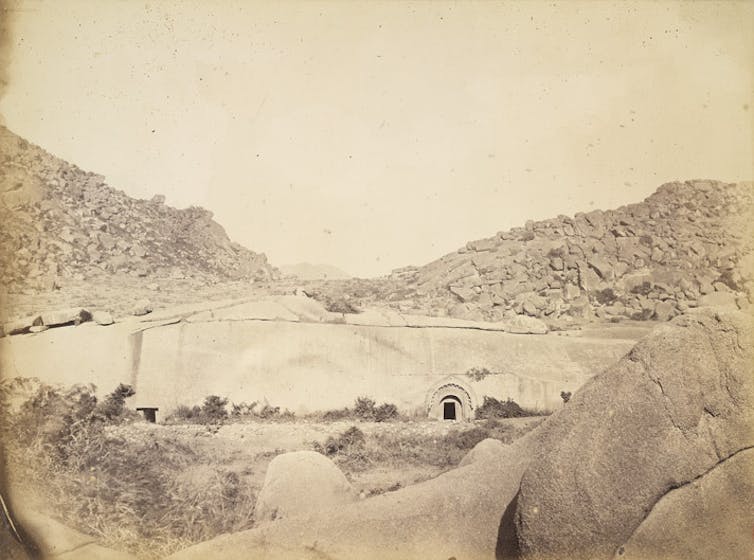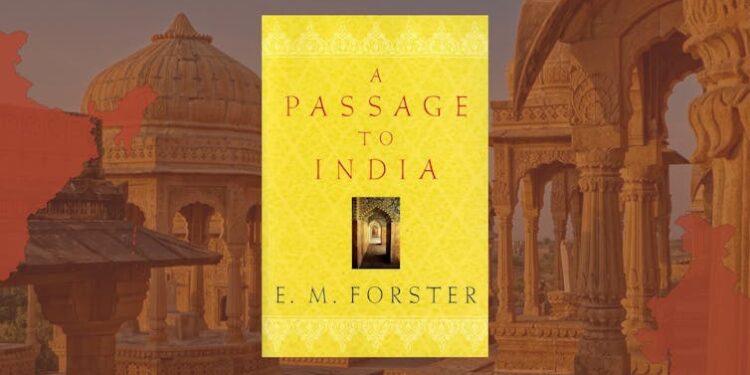Chris Mourant, University of Birmingham
E.M. Forster’s final novel and masterpiece, A Passage to India, celebrated its centenary in 2024. It tells the story of Adela Quested, who arrives in the city of Chandrapore with Mrs Moore, the mother of her fiancé, hoping to see “the real India”.
On an excursion to the infamous Marabar caves with the Indian doctor Aziz and the English schoolteacher Cyril Fielding, the women hear an echo that sets in motion the events that unfold across the rest of the book.
The echo causes an existential crisis for Moore. Quested, meanwhile, believes she has been assaulted in one of the caves by Aziz. A court case ensues that sends both the British and Indian public into a frenzy. While giving evidence, Quested realises that Aziz is innocent and that her experience in the caves was possibly the result of hysteria or a hallucination.
The novel refuses to answer the question of what, if anything, happened in the caves. At the heart of the book is a vacant centre, a black hole around which everything turns. It is this uncertainty which has allowed readers to arrive at so many different interpretations of the novel across the decades. So, how can we read the novel today, over 100 years after its first publication?
This article is part of Rethinking the Classics. The stories in this series offer insightful new ways to think about and interpret classic books and artworks. This is the canon – with a twist.
In a letter to a friend, Forster said that he didn’t know himself what happened in the caves; that he performed a “particular trick” by willing his “writing mind” to “remain a blur, and to be uncertain”. “I call it ‘trick’,” he wrote, “but ‘voluntary surrender to infection’ better expresses my state.”
A voluntary surrender to infection? That phrase has troubled and confused many readers. As the eminent literary critic Frank Kermode once exclaimed, it’s an “odd expression!” But returning to the book now, in our post-pandemic moment, these words resonate powerfully – especially because A Passage to India was written in post-pandemic times, too.

Forster started writing the novel after his first visit to India in 1912, when the country – along with much of Asia – was in the grip of the third plague pandemic. On the day he arrived in the new capital Delhi, questions were asked in the UK parliament about the plague in India, “which, last year, caused 842,000 deaths and which has, during the last 16 years, swept away 8,000,000 victims”.
Forster then put his manuscript aside, and only began writing again in earnest after his second visit to India in 1921, when the world was emerging, traumatised, from the global influenza pandemic of 1918. That pandemic killed somewhere between 50 and 100 million people, and India was hit especially hard. Some studies suggest that in British-controlled areas of the country alone, 13.88 million people died.
As professor of literature Elizabeth Outka has observed, this event of mass death is everywhere in the literature of the period. But it has often gone unnoticed, overshadowed by the more obvious violence of the first world war.
The flow of disease
In the opening chapter of A Passage to India, Forster references influenza, a word that stems from the Latin influentia (“to flow into”). These etymological roots reflect the medieval belief that intangible fluid flowing from the stars was the cause of disease, affecting or “influencing” people.
Setting the scene at Chandrapore, the narrator describes all human life as determined by “the overarching sky” in which “the stars hang like lamps from the immense vault” – “the sky settles everything”. Under this stellar influence, disease spreads across the novel.
The social pressures exerted by colonialism are described as “viral”, with Aziz “breathing the prevalent miasma” and Fielding’s “nerves breaking under the contagion”. In one of the book’s central scenes, Fielding visits the feverish Aziz in his sickbed.
And the infection spreads to Quested, it seems, as she prepares to give evidence at court:
The touch of her hands on her face started prickly heat, and she seemed to swallow and expectorate the same insipid clot of air that had weighed on her lungs all the night.

That which is “in the air” becomes highly significant. The “reputation” of the Marabar caves, we are told, “does not depend upon human speech”:
It is as if the surrounding plain or the passing birds have taken upon themselves to exclaim ‘extraordinary’, and the word has taken root in the air, and been inhaled by mankind.
There is something distinctly pathogenic about this – an airborne infection.
Inside one of the caves, Moore “couldn’t breathe, and some vile naked thing struck her face and settled on her mouth like a pad”. Later, bodies in the returning train “all resembled corpses, and the train itself seemed dead though it moved – a coffin”.
Moore is haunted by this experience, as if possessed by what is in the air. Words previously spoken with affection “seemed no longer hers but the air’s”, and she “surrendered to the vision” of an indifferent universe.
The “ou-boum” sound heard in the caves has often been interpreted as a distant echo of the trenches. But reading A Passage to India today, as we reflect on and reckon with the huge toll of the COVID pandemic, the “horror” unleashed by the caves resonates with a different trauma – reflecting a world changed irrevocably by disease.
Beyond the canon
As part of the Rethinking the Classics series, we’re asking our experts to recommend a book or artwork that tackles similar themes to the canonical work in question, but isn’t (yet) considered a classic itself. Here is Chris Mourant’s suggestion:
If you liked A Passage to India, try Untouchable by Mulk Raj Anand (1935), which is also set in India and centrally concerned with themes of dirt and contagion.
Inspired by the “day in the life” form of modernist city novels, such as Ulysses by James Joyce (1922) and Mrs Dalloway by Virginia Woolf (1925), Anand’s book tells the story of Bakha, an 18-year-old sweeper and toilet cleaner who inwardly revolts against his low position as an “untouchable” in the Indian caste system.
Forster wrote a preface to this novel in which he observed: “Bakha is a real individual – lovable, thwarted, sometimes grand, sometimes weak, and thoroughly Indian.”
Chris Mourant, Lecturer in Early Twentieth-Century English Literature, University of Birmingham
This article is republished from The Conversation under a Creative Commons license. Read the original article.











